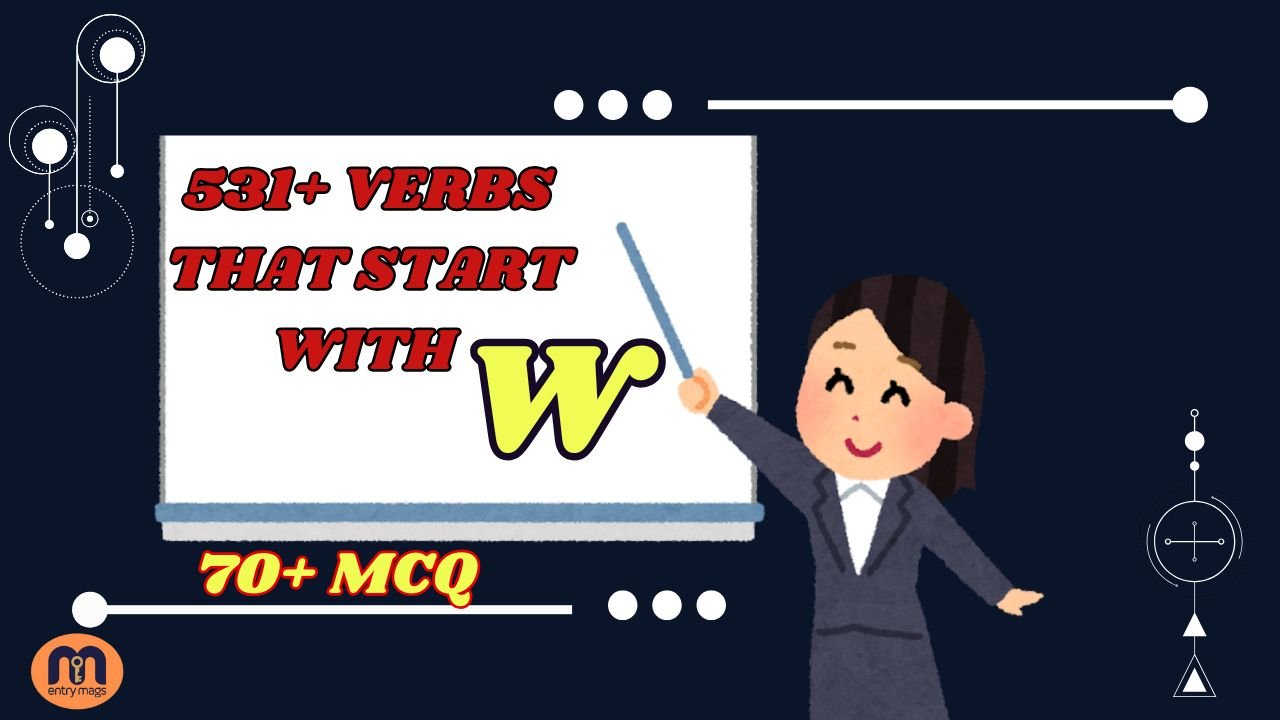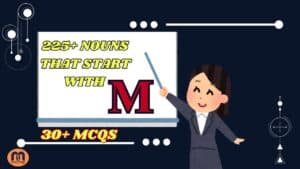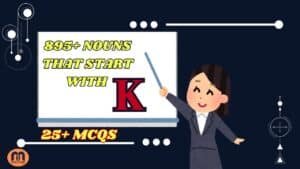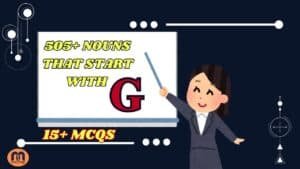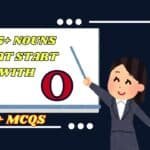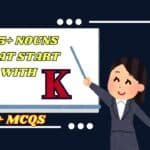Verbs That Start With W: In the vast world of the English language, verbs are the engines that power communication.
They’re the action words that help convey everything from the mundane to the extraordinary. Whether you’re writing a novel, composing an email, or simply engaging in a casual conversation, having a rich and diverse vocabulary is crucial.
So, let’s explore a fascinating category of verbs that often get overlooked: those that start with the letter “W”.
You might not realize it, but “W” verbs are deeply integrated into our daily interactions. These words can express emotions, actions, and states of being. From whispering a secret to wielding a sword, “W” verbs are varied and impactful.
In this article, we’ll explore over 531+ verbs starting with “W,” shedding light on their meanings, uses, and how they can enrich your vocabulary.
The Power of Verbs That Start with “W”
Verbs beginning with “W” are not just common but also versatile. These words can describe physical actions, mental processes, and even abstract concepts. With over 531+ entries, the list of “W” verbs covers everything from simple actions like walk to complex behaviors like warrant.
Whether you’re a student, a writer, or someone looking to spice up your conversations, knowing a wide variety of “W” verbs can enhance your language skills and communication abilities. Let’s take a closer look at some essential “W” verbs you can incorporate into your speech or writing.
Common Verbs Starting with “W”
Here are some widely-used verbs starting with “W” that are perfect for everyday conversations and writing.
- Wait – To stay in place or remain inactive until a particular event occurs.
- Walk – To move on foot at a moderate pace.
- Win – To achieve victory in a contest or competition.
- Write – To form letters or words on a surface with a pen, pencil, or keyboard.
- Whisper – To speak very softly using one’s breath rather than one’s vocal cords.
- Wish – To hope for or desire something.
- Work – To engage in physical or mental activity to achieve a result.
- Worry – To feel anxious or concerned about something.
- Warn – To inform someone about a potential danger or problem.
- Weigh – To measure the weight of something.
Action-Oriented Verbs That Begin with W
Some “W” verbs are specifically action-driven. These verbs emphasize physical movements, decisions, or tasks.
- Waddle – To walk with short steps, swaying from side to side.
- Wade – To walk through water or another substance that impedes movement.
- Wield – To hold and use a weapon or tool effectively.
- Wring – To twist or squeeze something, especially to remove moisture.
- Whip – To strike or beat with a sharp movement, often to create force.
- Wade – To walk through water, mud, or any substance.
- Warp – To bend or twist out of shape, especially by heat or pressure.
- Wave – To move one’s hand to and fro as a greeting or signal.
Mental and Emotional “W” Verbs
Not all verbs beginning with “W” are physical. Many are related to our thoughts, feelings, or mental states.
- Wonder – To feel curiosity or awe about something.
- Worry – To feel anxious or troubled over something uncertain.
- Warrant – To justify or provide a legitimate reason for something.
- Wish – To long for or desire something.
- Wrangle – To argue or dispute persistently.
Verbs That Describe Processes or States
Some “W” verbs describe ongoing processes or states of being rather than physical actions.
- Weaken – To make or become weaker or less powerful.
- Worsen – To deteriorate or become worse.
- Wither – To dry up or shrivel due to lack of water or care.
- Wallow – To roll or lie in something (like mud or water), often for comfort or enjoyment.
- Wait – To remain in place until a particular time or event occurs.
Uncommon Yet Useful “W” Verbs
Here’s a selection of more specialized verbs that begin with “W,” perfect for those looking to expand their vocabulary even further.
- Warrant – To guarantee or justify the necessity of something.
- Winnow – To remove unwanted elements from a mixture.
- Wreathe – To form into a circular shape, often used for decoration.
- Wrack – To cause great damage or destruction.
- Wend – To move in a particular direction, often slowly or indirectly.
- Whine – To complain or express dissatisfaction in a high-pitched voice.
Wanderlust Verbs That Take You Places
These verbs invite you to explore, whether physically, mentally, or emotionally. From strolling through nature to meandering through thoughts, they offer a sense of adventure that brings life to any story or conversation.
- Wander
- Wade
- Weave
- Waltz
- Whisk
- Whip
- Wend
- Wallow
- Whimper
- Whiz
- Wreak
- Wade
- Wander
- Whistle
- Weep
- Whack
- Whine
- Whip
- Wriggle
- Wrangle
- Wring
- Whiff
- Wobble
- Whack
- Wangle
- Waddle
- Whir
- Whelp
- Wrench
- Whisk
- Wreak
- Waddle
- Wrangle
- Wink
- Wobble
- Wait
- Wander
- Whisk
- Wail
- Whip
- Warrant
- Wag
- Wring
- Whimsy
- Wallow
- Wind
- Whisper
- Whistle
- Weave
Whispers Wishes and Wonders A World of Words
These verbs are perfect for moments filled with curiosity, dreams, and quiet conversations. Whether you’re whispering a secret or wishing for something greater, these words evoke a sense of mystery and desire.
- Whisper
- Wish
- Wonder
- Warrant
- Wrangle
- Weigh
- Winnow
- Whine
- Weaken
- Wreck
- Whiz
- Weave
- Wail
- Wander
- Wring
- Wrest
- Whack
- Whisk
- Wobble
- Waltz
- Wrangle
- Wobble
- Wither
- Whisper
- Whip
- Winnow
- Wreck
- Whizz
- Weigh
- Whim
- Whimper
- Wring
- Wallow
- Wring
- Wave
- Weaken
- Whack
- Wrestle
- Wade
- Wade
- Wish
- Whirr
- Wrangle
- Warrant
- Witch
- Waddle
- Wham
- Whistle
- Whiff
- Whisk
Power in Action Strong Verbs to Use Daily
These verbs are about action, precision, and strength. They help describe physical movement or decisive decisions, making them ideal for high-energy situations or when you need to command attention.
- Wield
- Whip
- Wring
- Win
- Whisk
- Wrestle
- Whack
- Wage
- Wave
- Whip
- Wrangle
- Wham
- Whip
- Wrestle
- Wreck
- Wrench
- Whizz
- Wring
- Wield
- Wail
- Wreck
- Whack
- Whip
- Wobble
- Weigh
- Winnow
- Wrench
- Whisk
- Wham
- Wiggle
- Wrest
- Whizz
- Weaken
- Wreck
- Wring
- Wham
- Waddle
- Weigh
- Wail
- Wind
- Weld
- Wade
- Whine
- Wring
- Whip
- Whiff
- Wrest
- Whisk
- Wring
From Work to Wonder Elevate Your Vocabulary
These verbs transition from the routine tasks of everyday work to the awe of dreams and possibilities. They are ideal for both practical actions and moments filled with wonder and ambition.
- Work
- Weave
- Warrant
- Wish
- Worsen
- Wrangle
- Wend
- Whine
- Wreck
- Wallow
- Whip
- Whisk
- Wham
- Whisper
- Wring
- Wobble
- Wage
- Warrant
- Waltz
- Wander
- Whip
- Wrangle
- Wield
- Winnow
- Wobble
- Wreck
- Whisper
- Wring
- Whiz
- Whisk
- Wham
- Waltz
- Wail
- Whiff
- Wade
- Weigh
- Wish
- Wrestle
- Wallow
- Wring
- Wobble
- Whisper
- Whack
- Wince
Waltzing Through Life Fun and Flowing Verbs
Life moves with rhythm, and these verbs help capture the graceful motions that carry us forward. Use these verbs to describe smooth actions and effortless transitions, both in conversation and writing.
- Waltz
- Whisk
- Wend
- Weave
- Whip
- Wander
- Wallow
- Wave
- Writhe
- Wring
- Whimsy
- Whiff
- Waddle
- Whiz
- Wrest
- Whack
- Whisper
- Weld
- Whim
- Waltz
- Waddle
- Whip
- Whisk
- Whir
- Weigh
- Wind
- Wobble
- Wring
- Wrestle
- Whisper
- Wreck
- Wobble
- Wade
- Whiff
- Wish
- Whack
- Weigh
- Whip
- Wrest
- Whine
- Waltz
- Wag
- Wham
- Wean
- Wrangle
- Weigh
Whiz Through Words Verbs That Show Speed
These verbs are perfect for describing actions that happen in a flash. Use them to convey urgency, excitement, or a sense of rapid movement. Whether it’s a fast decision or a quick movement, these verbs bring energy to your expression.
- Whiz
- Whip
- Waltz
- Whisk
- Wreck
- Whack
- Wander
- Wring
- Weld
- Wham
- Whip
- Whip
- Whisk
- Whiz
- Wreck
- Wobble
- Wham
- Wriggle
- Waltz
- Whizz
- Whim
- Wring
- Wrench
- Weigh
- Wrest
- Weigh
- Wallow
- Whizz
- Whisk
- Whack
- Wind
- Weave
- Wage
- Whip
- Wobble
- Wrestle
- Whir
- Wean
- Whinge
- Wrench
- Winnow
- Wink
- Wham
- Whiff
- Wiggle
Wit Will and Wisdom Verbs for Sharp Minds
These “W” verbs convey intelligence, decision-making, and mental clarity. They are perfect for describing how we think, reason, and engage with the world around us, allowing you to express depth and insight.
- Warrant
- Weigh
- Wield
- Wrangle
- Winnow
- Wish
- Wobble
- Weaken
- Withstand
- Writhe
- Wit
- Whisper
- Wrest
- Wrack
- Wham
- Weep
- Weigh
- Wield
- Wobble
- Whizz
- Warrant
- Wallow
- Wring
- Whack
- Whisper
- Wrangle
- Whack
- Wrestle
- Whizz
- Wobble
- Witch
- Wile
- Weaken
- Whimsy
- Wit
- Whizz
- Wrest
- Whine
- Wobble
- Warrant
- Wham
- Waltz
- Wring
Weathering the Storm Resilient and Strong Verbs
Life is full of challenges, and these “W” verbs capture the strength needed to overcome them. Whether you’re fighting through adversity or standing your ground, these verbs emphasize resilience and endurance.
- Withstand
- Wreck
- Weigh
- Winnow
- Weaken
- Warrant
- Wrangle
- Wrestle
- Whip
- Whisper
- Wade
- Wham
- Whizz
- Whack
- Whisk
- Weigh
- Wrack
- Weaken
- Whine
- Wade
- Whip
- Wreak
- Wield
- Writhe
- Whine
- Waltz
- Wiggle
- Wring
- Whack
- Whistle
- Wander
- Wallow
- Wrangle
- Wobble
- Waltz
- Wrench
- Wind
- Whizz
- Whip
- Wriggle
- Whiz
- Wrest
When Words Work Wonders Magical Verbs for Storytelling
These verbs bring an enchanting and magical quality to your writing or speaking. They’re perfect for creating vivid imagery or weaving a captivating tale, transforming the mundane into something extraordinary.
- Waltz
- Whisper
- Weave
- Warrant
- Wander
- Wish
- Whizz
- Wreck
- Wring
- Wield
- Wham
- Whisk
- Whim
- Wobble
- Wrench
- Whirl
- Weep
- Whizz
- Whack
- Wobble
- Whine
- Wallow
- Whiff
- Wallow
- Weigh
- Whack
- Whisper
- Whisper
- Wobble
- Whimsy
- Whisk
- Wring
- Wham
- Whiz
- Wreck
- Wind
- Weave
- Whip
- Wham
- Whiz
- Whip
Wild and Unusual Uncommon ‘W’ Verbs to Stand Out
Want to impress with unique and less common verbs? These words will bring fresh and exciting expressions to your writing and speech, helping you stand out with your distinctive style.
- Wend
- Whisper
- Wham
- Writhe
- Winnow
- Whack
- Weld
- Wrack
- Wobble
- Wager
- Wink
- Whirl
- Wring
- Wham
- Whizz
- Whip
- Whizz
- Whip
- Wobble
- Whack
- Wander
- Whip
- Whiff
- Wean
- Wrangle
- Wobble
- Wend
- Whiff
- Wince
- Whistle
- Wobble
- Wail
- Wretch
- Whip
- Wag
- Wade
- Wreck
- Wham
- Wander
- Wrestle
- Whiz
- Wiggle
Enhancing Your Language Skills with “W” Verbs
Now that you have a thorough list of verbs starting with “W,” let’s talk about how to incorporate them into your speech and writing. Here are a few tips:
1. Expand Your Vocabulary
When you learn verbs that start with “W,” try using them in sentences or scenarios. For example:
- “I decided to wander around the park after the rain stopped.”
- “The team managed to wield their influence and win the match.”
2. Be Creative
Challenge yourself to write a short story or an essay using as many “W” verbs as possible. This can be a fun and engaging way to internalize these words and use them more naturally in conversation.
3. Keep a Verb Journal
Record new verbs in a journal. Write a definition for each and use it in at least one sentence. Over time, this will help you retain new vocabulary.
Conclusion: Verbs That Start With “W”
The world of “W” verbs is vast, offering a variety of words that can enhance the expressiveness of your language. Whether you’re looking to improve your writing, boost your verbal communication skills, or simply enjoy the richness of the English language, these 531+ verbs are a fantastic resource.
So, next time you’re crafting a sentence or engaged in a conversation, reach for a verb starting with “W” it might just be the perfect fit. [Verbs That Start With W]
Now, it’s your turn! Which “W” verbs will you start using in your everyday language?
MCQs Quiz: Verbs That Start With “W”
1. Which verb suggests an adventurous journey or exploration?
A) Weigh
B) Wander
C) Whip
D) Wriggle
Answer: B) Wander
2. Which verb is associated with moving or dancing in a graceful, flowing manner?
A) Wobble
B) Wriggle
C) Waltz
D) Wring
Answer: C) Waltz
3. What verb would you use to describe the action of swiftly moving something with a quick motion?
A) Whisk
B) Wail
C) Weave
D) Wobble
Answer: A) Whisk
4. Which of these verbs would best describe the act of experiencing a loss of strength or vigor?
A) Wreck
B) Weigh
C) Weaken
D) Whip
Answer: C) Weaken
5. What verb is most commonly used when talking about making an effort to gain something through a struggle?
A) Weigh
B) Wring
C) Wrestle
D) Whine
Answer: C) Wrestle
6. Which of the following verbs can be used to convey a sense of quiet, secretive communication?
A) Wail
B) Whimper
C) Whistle
D) Whisper
Answer: D) Whisper
7. Which verb describes the action of fluctuating or moving in a shaky or uncertain manner?
A) Wring
B) Wobble
C) Wham
D) Wind
Answer: B) Wobble
8. Which verb is most closely associated with causing something to break or become damaged?
A) Wring
B) Wobble
C) Wreck
D) Whisk
Answer: C) Wreck
9. Which verb would best describe a sudden, strong, and forceful action, such as hitting something hard?
A) Whisk
B) Whack
C) Wobble
D) Wring
Answer: B) Whack
10. What verb can describe an action where someone carefully or intentionally decides between options?
A) Weigh
B) Wish
C) Wobble
D) Wander
Answer: A) Weigh
11. Which verb is used when someone is engaged in a verbal conflict or negotiating a difficult situation?
A) Wrangle
B) Whisk
C) Wobble
D) Wander
Answer: A) Wrangle
12. What verb is typically used when someone experiences an overwhelming emotional or physical state, like sadness or distress?
A) Weep
B) Wink
C) Whine
D) Wean
Answer: A) Weep
13. Which verb would be used to describe a movement that is rapid and seems effortless, often done quickly or in a rush?
A) Wring
B) Whip
C) Whistle
D) Whiz
Answer: B) Whip
14. What verb suggests moving in a roundabout way, often with a sense of wandering or being lost?
A) Wobble
B) Weigh
C) Wallow
D) Wend
Answer: D) Wend
15. Which verb describes a continuous, gentle movement or sound, often associated with air or water?
A) Whip
B) Wind
C) Wham
D) Whistle
Answer: B) Wind
16. Which of these verbs indicates a soft, gentle exhalation or emission of breath or air?
A) Whiff
B) Wail
C) Wink
D) Wobble
Answer: A) Whiff
17. Which verb would you use when someone is physically or emotionally enduring something difficult?
A) Wobble
B) Withstand
C) Whine
D) Whizz
Answer: B) Withstand
18. Which verb would best describe causing something to rotate or spin quickly in a circular motion?
A) Wobble
B) Whirl
C) Wring
D) Wrench
Answer: B) Whirl
19. Which verb suggests a movement that is quick and nimble, typically with light or rapid actions?
A) Wobble
B) Wring
C) Whip
D) Winkle
Answer: C) Whip
20. Which verb would you use to describe the action of gradually reducing or decreasing something?
A) Weaken
B) Wring
C) Wreck
D) Wham
Answer: A) Weaken
21. What verb refers to a physical motion of shaking or twisting something to remove liquid or excess?
A) Wring
B) Wobble
C) Wink
D) Wrench
Answer: A) Wring
22. Which verb describes a sound produced by blowing air through a small hole or whistle?
A) Whistle
B) Wobble
C) Wobble
D) Whine
Answer: A) Whistle
23. Which of these verbs is typically used to describe walking or moving with heavy or slow steps, often in water or soft ground?
A) Wade
B) Wink
C) Wham
D) Wobble
Answer: A) Wade
24. Which verb suggests a sudden, explosive sound or force, like a hammer strike?
A) Whizz
B) Wham
C) Whine
D) Whistle
Answer: B) Wham
25. What verb would you use to describe a situation where a person starts something, such as a journey or action, from a specific point?
A) Wander
B) Weave
C) Warrant
D) Withstand
Answer: A) Wander
26. Which verb describes the gentle, flowing movement of something like fabric or hair?
A) Wobble
B) Wring
C) Waffle
D) Weave
Answer: D) Weave
27. Which verb would best describe experiencing or undergoing a slow, tiring, or unpleasant emotional or physical state?
A) Wobble
B) Whine
C) Wallow
D) Wink
Answer: C) Wallow
28. What verb would you use to describe the physical act of holding or using something in a controlling way?
A) Wield
B) Wring
C) Wobble
D) Whip
Answer: A) Wield
29. Which of these verbs means to make a decision about something or judge its value?
A) Weigh
B) Wink
C) Weaken
D) Weave
Answer: A) Weigh
30. Which verb would you use when someone is feeling doubt or hesitation about a situation or decision?
A) Whisk
B) Wink
C) Weigh
D) Wallow
Answer: C) Weigh
31. What verb could describe a small, rapid, and often spontaneous movement?
A) Whip
B) Wobble
C) Wriggle
D) Wander
Answer: C) Wriggle
32. Which verb is associated with causing someone to feel an intense, negative emotional response or discomfort?
A) Weep
B) Wobble
C) Wobble
D) Whine
Answer: A) Weep
33. What verb best describes a movement where someone moves with unsteady or uneven steps?
A) Waddle
B) Wring
C) Wobble
D) Whizz
Answer: A) Waddle
34. Which verb best describes the action of gradually weakening or causing someone or something to become less strong?
A) Weaken
B) Wrangle
C) Wring
D) Whip
Answer: A) Weaken
35. Which of these verbs means to engage in a dispute, often over something trivial?
A) Wrangle
B) Whip
C) Whisk
D) Wink
Answer: A) Wrangle
36. Which verb describes the action of covering something with a sudden movement of air or breath?
A) Whiff
B) Whirl
C) Whip
D) Wobble
Answer: A) Whiff
37. Which verb would you use to describe the action of twisting or turning something in order to adjust it?
A) Wring
B) Whisk
C) Whip
D) Wobble
Answer: A) Wring
38. Which of these verbs describes a rapid, continuous movement of wind or something similar?
A) Whistle
B) Whizz
C) Wind
D) Whack
Answer: B) Whizz
39. What verb describes a sudden, loud noise or event, often associated with shock or impact?
A) Whistle
B) Wobble
C) Wham
D) Wriggle
Answer: C) Wham
40. Which verb would be used to describe a deep, long cry or sound of distress?
A) Whine
B) Wail
C) Wink
D) Whim
Answer: B) Wail
41. Which verb describes the action of rotating something or causing it to move in a circular manner?
A) Wring
B) Whisk
C) Wind
D) Whirl
Answer: D) Whirl
42. Which of these verbs is used when describing someone being unhappy or dissatisfied, often in a complaining manner?
A) Whine
B) Wink
C) Wobble
D) Weigh
Answer: A) Whine
43. What verb would you use to describe a situation where someone is moving quickly, often in a light or fast manner?
A) Whizz
B) Wobble
C) Wring
D) Waddle
Answer: A) Whizz
44. Which verb is used to describe the action of crying softly or quietly, usually in a distressed manner?
A) Whimper
B) Whine
C) Wobble
D) Wink
Answer: A) Whimper
45. What verb refers to moving quickly through or across an area, often with a sense of urgency or haste?
A) Wander
B) Whip
C) Whizz
D) Wind
Answer: C) Whizz
46. Which verb would best describe making something clean or dry by moving it quickly through the air or by wiping?
A) Whisk
B) Wobble
C) Wring
D) Whine
Answer: A) Whisk
47. Which verb refers to the action of removing moisture or liquid by twisting or compressing something?
A) Wring
B) Whisk
C) Wobble
D) Whiz
Answer: A) Wring
48. Which of these verbs suggests a state of great motion or activity, like in a storm or whirlwind?
A) Wham
B) Wind
C) Whirl
D) Whack
Answer: C) Whirl
49. What verb is used when someone is talking or communicating softly, usually to someone close by?
A) Whisper
B) Whine
C) Whiff
D) Wink
Answer: A) Whisper
50. Which verb would you use to describe the movement of something being blown by a strong gust of wind?
A) Whistle
B) Wham
C) Whizz
D) Wind
Answer: D) Wind
51. Which verb best describes the action of causing something to bend, twist, or distort, often with effort?
A) Wrench
B) Wobble
C) Wriggle
D) Weigh
Answer: A) Wrench
52. Which verb would you use to describe experiencing the feeling of joy or delight, often related to something small or quick?
A) Wink
B) Wobble
C) Whiff
D) Weep
Answer: A) Wink
53. Which of the following verbs refers to the act of fluctuating or moving back and forth without a fixed path?
A) Wander
B) Weigh
C) Wobble
D) Wrangle
Answer: C) Wobble
54. Which verb would best describe a situation where someone is making a sudden, loud sound as they exhale or breathe through their mouth?
A) Whistle
B) Wail
C) Wobble
D) Wriggle
Answer: A) Whistle
55. Which of these verbs refers to making a swift or jerky motion, often with a mechanical or forceful action?
A) Wham
B) Wobble
C) Whip
D) Wail
Answer: C) Whip
56. Which verb is typically used to describe the act of attempting to accomplish something by working hard and focusing attention on it?
A) Wobble
B) Weigh
C) Wrangle
D) Wrestle
Answer: D) Wrestle
57. Which verb refers to the act of making a sharp, high-pitched sound, like a bird or whistle?
A) Whiff
B) Whistle
C) Wham
D) Wink
Answer: B) Whistle
58. What verb would you use to describe a quiet or subtle movement that shows uncertainty or a small amount of progress?
A) Wobble
B) Weep
C) Whimper
D) Wink
Answer: A) Wobble
59. Which verb would be used to describe the act of moving with uncertain steps or with difficulty?
A) Wander
B) Wade
C) Wobble
D) Whistle
Answer: B) Wade
60. What verb suggests a gentle or controlled movement that avoids sudden jerks or shifts, like moving through water?
A) Wham
B) Wade
C) Wobble
D) Wobble
Answer: B) Wade
61. Which verb refers to making something lighter in weight or improving its quality by removing unnecessary parts?
A) Weaken
B) Whisk
C) Wobble
D) Weigh
Answer: B) Whisk
62. Which verb suggests a quick, sharp exhalation of air that creates a gentle sound?
A) Whiff
B) Wink
C) Whistle
D) Wail
Answer: A) Whiff
63. Which of the following verbs describes the action of twisting something forcefully, usually in a direction to extract liquid?
A) Wring
B) Whizz
C) Wobble
D) Whack
Answer: A) Wring
64. Which verb would you use to describe the process of feeling a deep, emotional loss or experiencing a significant change?
A) Weep
B) Wobble
C) Whine
D) Wham
Answer: A) Weep
65. Which verb is used to describe the act of moving or shifting slowly through a space or area without much purpose?
A) Wander
B) Weigh
C) Wriggle
D) Wobble
Answer: A) Wander
66. What verb would you use to describe a sudden or rapid shift in direction or focus?
A) Whisk
B) Whack
C) Wobble
D) Whip
Answer: D) Whip
67. Which verb refers to the action of physically or emotionally moving beyond the usual limit or boundaries?
A) Withstand
B) Wrangle
C) Wham
D) Wobble
Answer: A) Withstand
68. Which verb describes a vigorous action that suggests strong emotions or energetic movements?
A) Wobble
B) Whip
C) Whine
D) Weep
Answer: B) Whip
69. Which of these verbs describes the process of achieving a goal by making difficult or challenging efforts?
A) Wrestle
B) Weep
C) Wink
D) Whine
Answer: A) Wrestle
70. Which verb best describes an action that involves moving something with effort and force to create a specific outcome?
A) Wring
B) Wham
C) Weigh
D) Wobble
Answer: B) Wham
Read more knowledgeable blogs on Entry Mags
